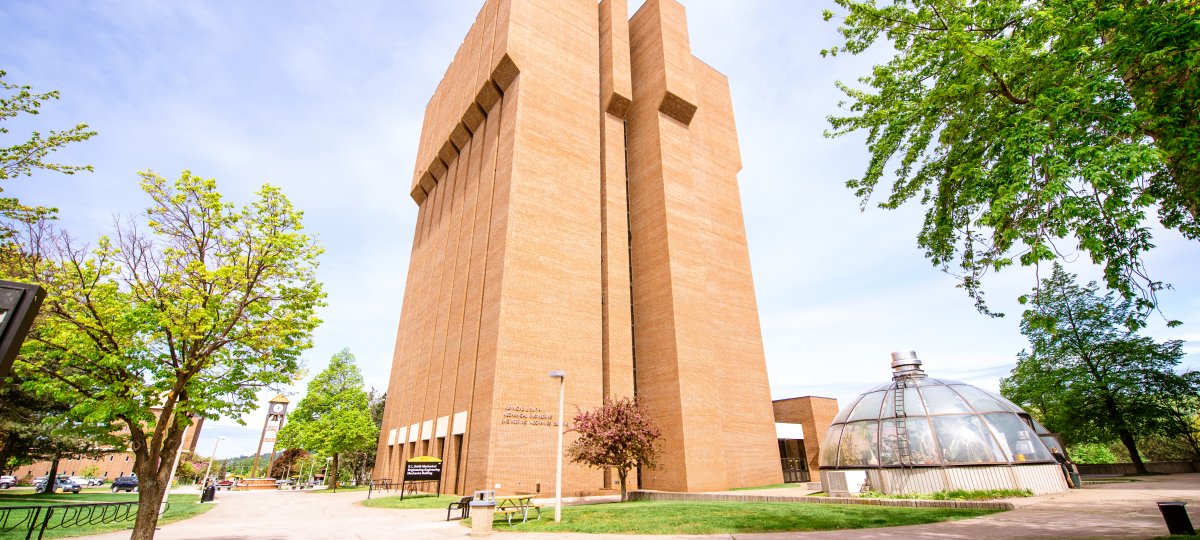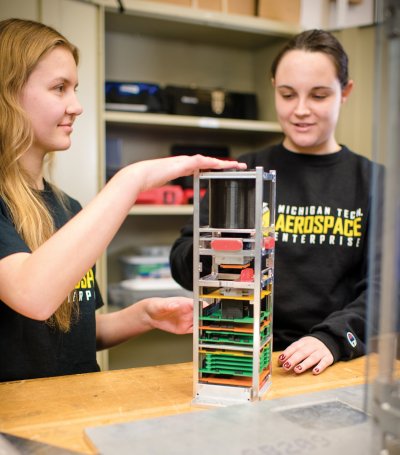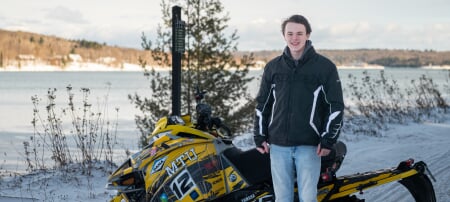This year, the Department of Mechanical and Aerospace Engineering has welcomed new faculty members and continued campus partnerships like Orbion Space Technologies, John Deere, Woodward Inc., and more!
New Faculty Highlights
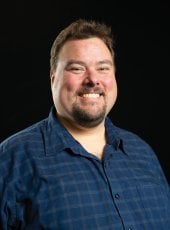
Chad M. Walber joined the department as an associate teaching professor in fall 2023. He earned his BS in Mechanical Engineering, BS in Electrical Engineering, and MS and PhD in Mechanical Engineering from Michigan Tech, and acquired industry experience as a technical support and R&D engineer for PCB Piezotronics.
Walber's specialty is testing and measurement of dynamic systems, noise and vibration, and acoustics. "I was very interested in the signal processing aspect of all of this from my electrical engineering classes, and really dug into it more when I started to work for PCB," he said. He helped develop new sensors and calibration methods for microphones and accelerometers at PCB, and is involved in calibration standards for both devices through the International Electrotechnical Commission. He also works with the Society of Experimental Mechanics' sensors and instrumentation technical committee.
His long-term goals include encouraging metrology discussions at Tech. "Part of almost every type of research that's done here has a measurement component, but sometimes we don't really think about how accurate our measurements really are, or if there might be a better way to measure the phenomena we look at," he said.
Short term, he is focused on student learning. "I'd like to get to know my students better and help them figure out how best they learn. I feel like when folks come to MTU, they don't realize that they can and should adapt their learning processes. The way a student learned things in high school may not be the best way for them to learn things going forward."
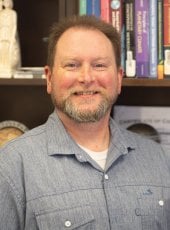
Shawn Brueshaber joined the MAE faculty in fall 2023 as an assistant professor. He earned his MS and PhD in Mechanical Engineering from Western Michigan University and his BS in Aerospace Engineering at Embry-Riddle Aeronautical University in Florida. He spent several years in industry, earning his master's degree while working full-time.
Brueshaber specializes in atmospheric planetary science, a research field that allows him to combine his interest in weather and planetary science with his formal education. His research at WMU focused on polar atmospheric dynamics of the gas giant planets: Jupiter, Saturn, Uranus, and Neptune.
According to Brueshaber, atmospheric planetary science has more potential for practical problem-solving applications here on Earth than it might seem at first glance. "Because our understanding of weather and climate is a subset of fluid dynamics, and, in turn, is a huge area of physics that is still not fully understood, atmospheric planetary science provides another rich field of science that may eventually lead to a more complete understanding of fluid mechanics," he said.
Brueshaber is working toward developing a deeper understanding of how planetary atmospheres work by continuing his current research. He intends to develop a new course on the basics of planetary science for engineering students who wish to work in the space industry. He also wants to begin new research focusing on clouds and precipitation in the Keweenaw, and plans to set up a more comprehensive suite of meteorology instrumentation for the area.

Bhisham Sharma joined the department as an associate professor in fall 2023, coming from Wichita State University's Department of Aerospace Engineering. He earned his BS in Mechanical Engineering at the University of Pune in India, and his MS and PhD in Aeronautical and Astronautical Engineering at Purdue University. He also spent a few years at Purdue as a postdoctoral research associate and visiting assistant professor.
Sharma's research involves solid mechanics, structural dynamics, acoustics, and advanced manufacturing. "At one end of the spectrum, I seek to understand fundamental mechanics and acoustics of novel engineered material systems such as acoustic metamaterials, phononic structures, architected lattice structures, and stochastic foams," he said. "At the other end, I focus on developing advanced manufacturing methods that can enable such structures." He translates his findings into the creation of "performance-tailored solutions to critical engineering problems across various industries."
"My work is inherently interdisciplinary, encouraging me to delve into physics, mathematics, and manufacturing," said Sharma. "This continuous opportunity to acquire new knowledge fuels my passion and excitement for this field. I am motivated by the prospect of pushing the boundaries of what is possible."
Tech's reputation for exceptional academics and interdisciplinary research drew Sharma to the University. He also noted the department's outstanding academic program and strong emphasis on equipping students with real-world experiences as significant factors in his decision. "As a faculty member, my own teaching philosophy and vision perfectly align with the department's approach as we bridge the gap between theoretical knowledge and practical engineering applications."
Tech Partners to Electrify Medium-duty Engines
Jeff Naber is Michigan Tech's lead on a three-year $2.5 million project with research partners John Deere, Woodward Inc., Oak Ridge National Laboratory, and the University of Colorado Boulder. The team will develop an advanced medium-duty spark engine that can operate on sustainable natural gas and natural gas/hydrogen blends. The project is funded by a research and development co-op joint agreement from the Office of Energy Efficiency and Renewable Energy (EERE), US Department of Energy.
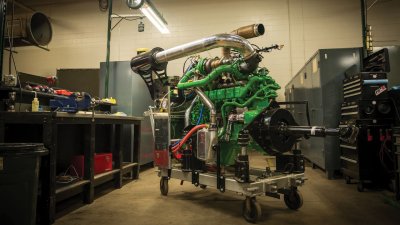
"As partners we have a long history of successful collaboration," said Naber, the director of Michigan Tech's Advanced Power Systems Research Center (APS LABS) and the Richard and Elizabeth Henes Professor in Energy Systems.
"We also have a great team of individual superstars on this project. We couldn't ask for a better team," he said.
The formal title of the project is "A low GHG advanced SI engine that can operate on NG and NG/H2 blends with diesel-equivalent performance for off-road applications."
Electrifying medium-duty engines is challenging. Most run on diesel fuel. These powerful engines move material—for construction, agriculture, forestry, and mining—in excavators, motor graders, loaders, and crawlers. Natural gas and a flex fuel of natural gas and hydrogen fuel are potentially viable alternatives with substantially lower greenhouse gas emissions. But developing a medium-duty engine that can run on NG/H2 blended fuels is no small task. Fortunately, for Naber, such a project is commonplace.
Working alongside Naber are several staff at APS LABS, along with two Mechanical and Aerospace Engineering faculty members: Jaclyn Johnson, an associate teaching professor, and Radheshyam Tewari, a teaching professor. Joining them is Wayne Gersie, vice president for engagement and belonging and a faculty member in the Department of Psychology and Human Factors.
Rocketing to the Top
Orbion Space Technologies is No. 7 on Fast Company's Top 10 list of the most innovative companies in space for 2024.
Research ingenuity and the right timing coalesced to propel Orbion forward following its establishment in 2016, says CEO L. Brad King, Michigan Tech's Richard and Elizabeth Henes Professor of Space Systems, Mechanical and Aerospace Engineering. King leveraged two decades of on-campus research and education to launch the off-campus company and lead the world, and perhaps the solar system, into a new space age.
Orbion employs more than 40 full-time engineers in its Houghton facilities. You'll find Huskies at the helm in several key positions—co-founder and Chief Technical Officer Jason Sommerville is a 2009 PhD graduate—but the company is more than just an outgrowth of Michigan Tech.
"The excitement and technology of Orbion, coupled with broader trends in the global space economy, have attracted A-list players," says King. "We have engineers and rocket scientists from NASA, SpaceX, Aerojet Rocketdyne, MIT, and major aerospace and automotive companies uprooting their families to move to Houghton and dedicate their careers to the Orbion vision."
Read more about the company in the feature story "Lift Off!" in this issue, and get background on one of the Keweenaw's most dazzling start-ups in "Origins of Orbion" in Michigan Tech's Research Magazine.
The Michigan Tech Aerospace Enterprise is developing the aerospace professionals and space systems of the future. King has mentored hundreds of undergraduates on the application of systems engineering to the development of complex systems such as spacecraft and autonomous vehicles. The organization is led and operated completely by undergraduate students, while King serves as an academic advisor.
Michigan Technological University is an R1 public research university founded in 1885 in Houghton, and is home to nearly 7,500 students from more than 60 countries around the world. Consistently ranked among the best universities in the country for return on investment, Michigan's flagship technological university offers more than 185 undergraduate and graduate degree programs in science and technology, engineering, computing, forestry, business, health professions, humanities, mathematics, social sciences, and the arts. The rural campus is situated just miles from Lake Superior in Michigan's Upper Peninsula, offering year-round opportunities for outdoor adventure.

